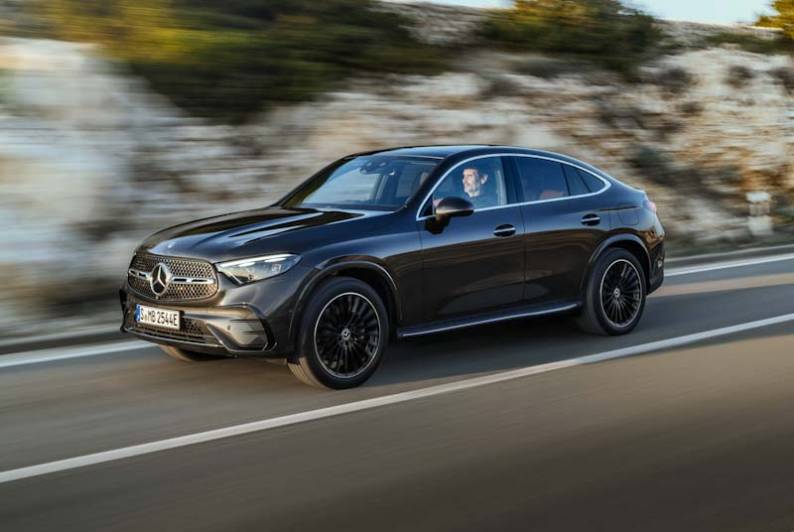
RAC sale – up to 33% off*
• Roadside cover from £5.29 a month†
• We get to most breakdowns in 60 mins or less
• Our patrols fix 4/5 breakdowns on the spot

The second generation version of the Mercedes GLC Coupe promises to be an even more tempting proposition in the coupe part of the upper mid-sized premium SUV segment. Jonathan Crouch takes a look.
Ten Second Review
Mercedes says this sleeker, more dynamic-looking version of their mid-sized GLC crossover is a 'coupe'. It's certainly more eye-catching than the standard-shape SUV model. But is this much improved second generation GLC Coupe a better match for arch-rivals BMW's X4 and Audi's Q5 Sportback? Let's find out.
Background
Some car makers (Jaguar and Alfa Romeo for instance) think coupe versions of mid-sized SUVs are unnecessary. The German posh brands though, all think this kind of variant essential, a trend started in 2014 with the BMW X4, then followed in 2016 by the first generation Mercedes GLC Coupe (and subsequently by the Audi Q5 Sportback). In 2022, Mercedes launched the standard SUV version of its second generation GLC. So it was natural that we would then also get a second generation GLC Coupe. That model, codenamed 'C254', is what we look at here.
Like the ordinary GLC, it's entirely C-Class-based and is built alongside that model at Mercedes' German factory in Bremen. The brand says it's developed this GLC Coupe to be a little more dynamic than its partner model. Is that what's being served up here? Let's take a look.
Driving Experience
Mercedes says it's made the steering of this second generation GLC Coupe a little sharper than the SUV version to give this sporty-looking variant a small dynamic edge. But the difference is slight. The engine range is the same as that of the ordinary model, which means it's fully electrified. As before, the line-up will mainly sell in 2.0-litre petrol and diesel forms, both units now embellished with mild hybrid tech. The GLC 220 d diesel has 194bhp; the GLC 200 petrol has 201bhp; and the GLC 300 petrol uses the same engine to put out 254bhp.
Over the last few years, this model line has been increasingly popular in Plug-in Hybrid form. So there's a wider range of PHEV variants this time round. The GLC 300 e and GLC 400 e models use the 2.0-litre petrol engine and respectively develop either 309bhp or 376bhp. The GLC 300 de, uniquely in-segment, uses a diesel mated to Plug-in power, that 2.0-litre unit, which in this form puts out 328bhp. The forthcoming GLC 43 and GLC 63 AMG performance variants will also get 2.0-litre four cylinder powerplants - petrol ones of course. As before, all models across the line-up feature 4MATIC all wheel drive and a 9-speed automatic gearbox. Optional is AIRMATIC air suspension and this MK2 model further adds the option of Rear-Axle Steering, the latter vastly improving the car's turning circle(by 90cm) and giving extra stability through the bends.
Design and Build
If you want a GLC, then it's probable that this is what you think it should look like. As with the previous model, this second generation GLC Coupe differs from the conventional GLC SUV with a sloping rear roof line flowing into a liftback-style tailgate. It's a slightly more upright thing now though, standing 55mm higher than the original. It's also 31mm longer (4,763mm long), with tauter surfacing, more pronounced feature lines and bigger wheel sizes. The contoured bonnet flows into a larger grille flanked by shapelier LED headlights. The tail lamps are redesigned too and there's a chromed lower valance with an integrated diffuser incorporating twin tailpipes.
Inside at the front, it's of course the same as the ordinary MK2 GLC, which means higher quality materials, a more up-market dashboard, re-styled vents, a smarter steering wheel, a 12.3-inch instrument display and an 11.9-inch portrait-orientated centre screen. The extra roof height and 15mm of extra wheelbase length help the rear cabin. The bench slides back and forth too, which aids cargo flexibility. And out back, the boot is 45-litres bigger at 545-litres with the conventional models (55-litres less than the GLC SUV); it's 390-litres for the GLC Coupe PHEVs. Fold the rear bench and there's 1,490-litres with a conventionally-engined GLC Coupe - or 1,335-litres if it's a PHEV.
Market and Model
Expect a big premium over the standard SUV body shape - around £6,500. Which means that prices for this second generation GLC Coupe start at around £60,000 for the base GLC 220 d AMG Line, rising to just under £80,000 for the top mainstream variant, the plug-in hybrid GLC 300 e Premium Plus. Across the range, expect the same 'AMG Line', 'AMG Line Premium' and 'AMG Line Premium Plus' trim levels.
At least the standard equipment is generous, with things like smartphone integration, wireless charging and heated front seats standard across the range. Many GLC customers will want to look at the optional 'DIGITAL LIGHT' headlamps. These project in front of the car onto the road surface when driving at night, with things like guidance lines, symbols and animation, plus the system's intelligent technology highlights pedestrians that you might come across with a spotlight function. If you've extra to spend, you might also want to look at the 'Parking Package' with its 360-degree camera.
Quite a few owners will want to add on a tow bar - and will like the new 'Towing Route Planner' that's been added into the navigation system. Using this, routes can be planned in the central display that are suitable for driving with a trailer, taking into account things like passage width and passage heights. And there's an enhanced 'Trailer Manoeuvring Assistant' system that makes manoeuvring with a trailer easier, more comfortable and safer.
Cost of Ownership
Given the huge proportion of business sales accounted for by the GLC Coupe, Mercedes couldn't afford to return anything but a stellar set of efficiency figures with this MK2 model - and that's what we've got from the fully electrified engine range. Most customers will be choosing either the mild hybrid diesel GLC 220d, which returns around 45mpg on the combined cycle: or the mild hybrid petrol GLC 200, which returns up around 32mpg on the combined cycle, as does the pokier petrol GLC 300.
If you want to do better, you'll need one of the Plug-in Hybrids. The two petrol PHEV variants, the GLC 300e and the GLC 400e, both are combined-cycle rated at just under 400mpg (yes, really). The diesel Plug-in variant, the GLC 300de, is rated at around to 470mpg. In reality, expect the kind of regular consumption figures you'd get from a decent diesel. The PHEVs have a bigger 31.2kWh battery this time round, which gives the petrol versions an EV driving range of between 74 and 81 miles; the diesel PHEV version has an even longer 81 mile range. There will also be four-cylinder PHEV powertrains for the C 43 and C 63 high performance AMG models - but with only tiny EV ranges.
What else? Well you get a comprehensive three year warranty that has no mileage restriction (rival BMW and Audi warranties restrict you to 60,000 miles). And this package is built upon by Mercedes' Mobilo scheme which delivers breakdown cover for up to thirty years, as long as you continue to have your car serviced at a Mercedes main dealer. And it's worth knowing that your maintenance outlay can be kept a little in check by going for the optional Service Care package that takes care of routine maintenance, spreading the cost of regular servicing.
Summary
As we always point out when reviewing this kind of car, a model of this sort will continually divide opinion. The folk who don't like it will tell you to save your money and buy a cheaper, more practical GLC SUV - but then they're probably the same people who can't see the point of anything prioritising style over substance. In any case, this second generation GLC Coupe does have substance to its proposition - at least when it comes to technology, quality and low running costs. Like its BMW X4 and Audi Q5 Sportback arch-rivals, it's even reasonably spacious and practical.
Your choice between those cars and this one will very much come down to personal preference but it'll certainly help this Mercedes' cause that GLC Coupe buyers get a wider range of slightly more frugal engine options and that this more modern design arguably has the edge when it comes to really cutting-edge media and safety features. There's a bigger thing though, that sets this car apart not only from an X4 and a Q5 Sportback but also from other potential rivals like Porsche's Macan, Jaguar's F-PACE and plusher versions of Range Rover's Evoque. Namely, the option of the kind of air suspension system that's usually limited to much bigger SUVs. We think that ideally, you really want that with this car.
With this in place, you'll be making a pretty pricey choice, but also potentially a very satisfying one, with a combination of frugality, space and comfort that competitors will find very hard to beat. True, an X4 or a Macan might ultimately be better through the bends, but this particular GLC now isn't as far away from that standard as you might expect and - in air suspended form at least - it has the measure of all its rivals when it comes to the more important issue of day-to-day ride comfort.
In summary, what we've got here is a very complete contender indeed. Nobody actually needs a SUV Coupe of this kind, but then nobody actually needs a more conventionally-styled fashionable SUV either: there are plenty of 4WD estates that would do the job just as well. Typical buyers though, take the SUV route because it makes a little more of a driveway statement. Which means that typical buyers with the necessary budget, are probably going to like this car very much indeed.



![Mercedes-AMG E 53 4MATIC+ Coupe [C238] (2018 - 2023) used car review](https://d1ix0byejyn2u7.cloudfront.net/drive/images/made/drive/images/remote/https_d2yv47kjv2gmpz.cloudfront.net/filestore/8/1/0/2_5fc0982a3eb48c1/b9507c31d0d3410b23b42fb6437a65d6/2018_c076c1f0a1703d0_100_100_70_c1_c_c.jpg)



